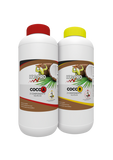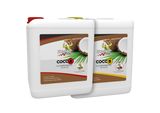PLANT NUTRIENTS ARE THE BUILDING BLOCKS OF CELLULAR MACHINERY
Plants require only light, water, and about 20 elements to support all their biochemical needs. These 20 elements are called essential nutrients. Essential elements required by plants: For an element to be regarded as essential a plant cannot complete its life cycle without the element, no other element can perform the function of the element, and the element is directly involved in plant nutrition. The essential elements can be divided into macronutrients and micronutrients. Nutrients that plants require in larger amounts are called macronutrients. About half of the essential elements are considered macronutrients: carbon, hydrogen, oxygen, nitrogen, phosphorus, potassium, calcium, magnesium, and sulfur.
**MACRONUTRIENTS ARE VITAL FOR ALL PLANTS AND CROPS.
HY-PRO Grow nutrition replenishes and maintains healthy nutrient levels.
The first of these macronutrients, carbon (C), is required to form carbohydrates, proteins, nucleic acids, and many other compounds; it is, therefore, present in all macromolecules. On average, the dry weight (excluding water) of a cell is 50 percent carbon, making it a key part of plant biomolecules. The next-most-abundant element in plant cells is nitrogen (N); it is part of proteins and nucleic acids. Nitrogen is also used in the synthesis of some vitamins. Hydrogen and oxygen are macronutrients that are part of many organic compounds and also form water. Oxygen is necessary for cellular respiration; plants use oxygen to store energy in the form of ATP. Phosphorus (P), another macromolecule, is necessary to synthesize nucleic acids and phospholipids. As part of ATP, phosphorus enables food energy to be converted into chemical energy through oxidative phosphorylation.
Sulfur is part of certain amino acids, such as cysteine and methionine, and is present in several coenzymes. Sulfur also plays a role in photosynthesis as part of the electron transport chain where hydrogen gradients are key in the conversion of light energy into ATP. Potassium (K) is important because of its role in regulating stomatal opening and closing. As the openings for gas exchange, stomata help maintain a healthy water balance; a potassium ion pump supports this process. Magnesium (Mg) and calcium (Ca) are also important macronutrients. The role of calcium is twofold: to regulate nutrient transport and to support many enzyme functions. Magnesium is important to the photosynthetic process. These minerals, along with the micronutrients, also contribute to the plant’s ionic balance.
**MICRONUTRIENTS FOR HEALTHY AND PRODUCTIVE PLANTS
Hy-Pro Grow Nutrition supports growing healthier crops and happier plants
In addition to macronutrients, organisms require various elements in small amounts. These micronutrients, or trace elements, are present in very small quantities. The seven main micronutrients include boron, chlorine, manganese, iron, zinc, copper, and molybdenum. Boron (B) is believed to be involved in carbohydrate transport in plants; it also assists in metabolic regulation. Boron deficiency will often result in bud dieback. Chlorine (Cl) is necessary for osmosis and ionic balance; it also plays a role in photosynthesis. Copper (Cu) is a component of some enzymes. Symptoms of copper deficiency include browning of leaf tips and chlorosis (yellowing of the leaves). Iron (Fe) is essential for chlorophyll synthesis, which is why an iron deficiency results in chlorosis.
Manganese (Mn) activates some important enzymes involved in chlorophyll formation. Manganese-deficient plants will develop chlorosis between the veins of its leaves. The availability of manganese is partially dependent on soil pH. Molybdenum (Mo) is essential to plant health as it is used by plants to reduce nitrates into usable forms. Some plants use it for nitrogen fixation; thus, it may need to be added to some soils before seeding legumes. Zinc (Zn) participates in chlorophyll formation and also activates many enzymes. Symptoms of zinc deficiency include chlorosis and stunted growth.
**REGULAR FERTILIZER USE WILL IMPROVE ALL PLANTS AND CROPS
Hy-pro Grow Nutrition improves the growth and health of all plants
In plant nutrition, it is important that there is no deficiency in primary or secondary macroelements or in essential microelements. Deficiencies in any of these nutrients, particularly the macronutrients, can adversely affect plant growth. Moreover, these elements must be present in the proper proportions. Plants consume primary macronutrients in large quantities, while their intake of secondary macronutrients is lower. Each of these nutrients has a distinct function, necessary for nourishing the plant. A shortage in any of them leads to deficiencies, with different adverse effects on the plant’s general state, depending upon which nutrient is missing and to what degree. Liquid fertilizers are wonderful for providing a regular shot of nutrients to houseplants, vegetable crops, flowering annuals and even perennials.
Hy-pro fertilizers’ grow nutrition products have proven their worth over the past 30 years and our simple formula en proven track record speaks for itself.









